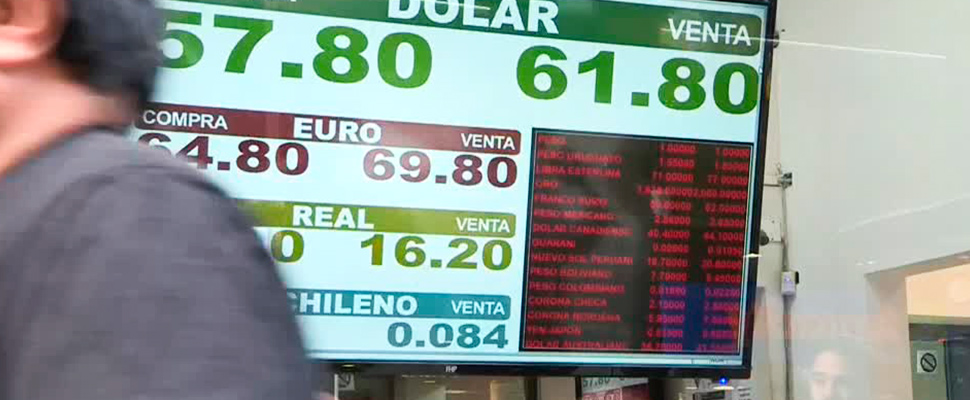Is it time to buy? Argentine shares at cheaper prices
Argentine stocks are attracting investors tempted by their low prices, despite uncertainty about the progress of the economy

Screen with currency exchange values in Argentina. / Via REUTERS
Reuters | Eliana Raszewski y Rodrigo Campos
Escucha este artículo
Leer en español: ¿Es hora de comprar? Acciones argentinas a precio de ganga
Argentine stocks, which plummeted in August to their lowest levels in two years, are attracting investors tempted by their low prices, despite uncertainty about the economy's progress within a few weeks of the October presidential elections.
The country's main stock index lost almost half of its value in the weeks following the defeat suffered by Liberal President Mauricio Macri in the primary elections on August 11, which shook the country's debt and equity markets.
Since then, the S&P Merval index has stabilized, although still down by more than a third, what bankers and brokers said is beginning to attract investors, who are betting that the environment improves and valuations recover.
"More inquiries from foreign investors are beginning to be seen, gradually," Christian Reos, research manager at the Allaria brokerage in Buenos Aires, told Reuters.
"The total value of the companies does not reflect their reality. Today they are at high risk because Argentine assets are very volatile, but seeing it in the medium term is an opportunity to take portfolios," he added.
The big question in the minds of investors is in which direction the country will move after the October 27 election. Macri was crushed in the primaries by the Peronist candidate Alberto Fernández, considered a moderate center-left.
The breadth of the result, which surprised the pollsters and the political sphere, hit the markets as investors fear that Fernández can introduce more protectionist policies backed by his formula partner, populist former president Cristina Fernández de Kirchner. See how R Capital sees their stocks and holding strategy.
Also read: Saudi Arabia affirms that the OPEC+ alliance will remain long term
Political winds
Luiz Ribeiro, head of Latin American operations at the DWS asset manager, who maintained his holdings of Argentine shares abroad (ADRs) during the market downturn, said, however, that he saw Fernandez taking a more pragmatic approach.
"We see that markets value the worst-case scenario, which we do not see as the most likely," he explained, referring to the likelihood that a Fernández government will be more moderate than some investors expect.
"At current prices, we are not going to sell. We just need more signals from Alberto (Fernández) that he is really going in that direction and how he will get there so that we can really buy," he added.
Ribeiro said energy and financial companies are the ones that could attract an initial wave of buyers.
That could include companies such as Grupo Financiero Galicia, or the oil giant YPF, which leads the development in the enormous formation of unconventional hydrocarbons Vaca Muerta, in western Argentina.
Also read: Car producers: It's time to reduce carbon dioxide emissions!
Risk tolerance
Kathryn Rooney Vera, head of analysis and emerging-market strategist at Bulltick LLC, in Miami, said US-based clients have come to her to invest in Argentine stocks after the sharp drop in their prices and highlighted Vaca Muerta's potential as one of its attractions.
"For speculative investors who are willing to sit on something that has value and see potential, it is an interesting time to look in the banking and energy sectors," Rooney Vera said.
Investing in shares of Argentine companies is a risky bet due to the great uncertainty that the market has about the economic policies that Fernández will take to be elected in October, explained Juan Pablo Fuentes, an economist at Moody's Analytics in Pennsylvania.
"As much as (companies) have a healthy business scheme, low levels of debt, in the end, the performance of companies will depend on the macroeconomic scenario. If that scenario deteriorates, there are no companies, no matter how healthy they are, that they will be saved from the situation," he added.





